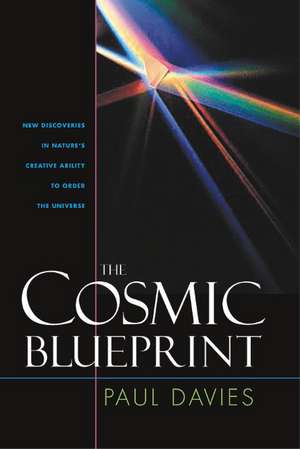Cosmic Blueprint: New Discoveries In Natures Ability To Order Universe
Autor Paul Daviesen Limba Engleză Paperback – 16 apr 2004 – vârsta ani
In this critically acclaimed book, first published in 1988 and now reprinted in paperback, scientist and author Paul Davies explains how recent scientific advances are transforming our understanding of the emergence of complexity and organization in the universe.
Melding a variety of ideas and disciplines from biology, fundamental physics, computer science, mathematics, genetics, and neurology, Davies presents his provocative theory on the source of the universe's creative potency. He explores the new paradigm (replacing the centuries-old Newtonian view of the universe) that recognizes the collective and holistic properties of physical systems and the power of self-organization. He casts the laws in physics in the role of a "blueprint," embodying a grand cosmic scheme that progressively unfolds as the universe develops.
Challenging the viewpoint that the physical universe is a meaningless collection of particles, he finds overwhelming evidence for an underlying purpose: "Science may explain all the processes whereby the universe evolves its own destiny, but that still leaves room for there to be a meaning behind existence."
Melding a variety of ideas and disciplines from biology, fundamental physics, computer science, mathematics, genetics, and neurology, Davies presents his provocative theory on the source of the universe's creative potency. He explores the new paradigm (replacing the centuries-old Newtonian view of the universe) that recognizes the collective and holistic properties of physical systems and the power of self-organization. He casts the laws in physics in the role of a "blueprint," embodying a grand cosmic scheme that progressively unfolds as the universe develops.
Challenging the viewpoint that the physical universe is a meaningless collection of particles, he finds overwhelming evidence for an underlying purpose: "Science may explain all the processes whereby the universe evolves its own destiny, but that still leaves room for there to be a meaning behind existence."
Preț: 168.89 lei
Nou
Puncte Express: 253
Preț estimativ în valută:
32.35€ • 33.33$ • 27.10£
32.35€ • 33.33$ • 27.10£
Carte indisponibilă temporar
Doresc să fiu notificat când acest titlu va fi disponibil:
Se trimite...
Preluare comenzi: 021 569.72.76
Specificații
ISBN-13: 9781932031669
ISBN-10: 1932031669
Pagini: 232
Dimensiuni: 152 x 229 x 20 mm
Greutate: 0.37 kg
Ediția:First Edition, First Edition, First Edition, 1
Editura: Templeton Press
Colecția Templeton Press
Locul publicării:United States
ISBN-10: 1932031669
Pagini: 232
Dimensiuni: 152 x 229 x 20 mm
Greutate: 0.37 kg
Ediția:First Edition, First Edition, First Edition, 1
Editura: Templeton Press
Colecția Templeton Press
Locul publicării:United States
Notă biografică
Paul Davies is professor of natural philosophy in the Australian Centre for Astrobiology at Macquarie University. His research has spanned the fields of cosmology, gravitation, and quantum field theory, with particular emphasis on black holes and the origin of the universe. He is currently working on the problem of the origin of life and the search for life on Mars. He is a well-known author, broadcaster, and public lecturer and has written over twenty-five books. Among his better-known works are God and the New Physics, The Mind of God, About Time, The Fifth Miracle, and How to Build a Time Machine. In recognition of his work as an author, he was elected as fellow of The Royal Society of Literature in 1999.
His contributions to science have been recognized by numerous awards, including the 2002 Michael Faraday Prize by the Royal Society and the 2001 Kelvin Medal and Prize from the U.K. Institute of Physics. In April 1999 the asteroid 1992 OG was officially named (6870) Pauldavies in his honor. His most significant award was the 1995 Templeton Prize for Progress in Religion, the world’s largest prize for intellectual endeavor.
His contributions to science have been recognized by numerous awards, including the 2002 Michael Faraday Prize by the Royal Society and the 2001 Kelvin Medal and Prize from the U.K. Institute of Physics. In April 1999 the asteroid 1992 OG was officially named (6870) Pauldavies in his honor. His most significant award was the 1995 Templeton Prize for Progress in Religion, the world’s largest prize for intellectual endeavor.
Cuprins
Preface to the 2004 Edition / ix
Preface to the First Edition / xv
Chapter 1 Blueprint for a Universe / 3
Chapter 2 The Missing Arrow / 9
Chapter 3 Complexity / 21
Chapter 4 Chaos / 35
Chapter 5 Charting the Irregular / 57
Chapter 6 Self-Organization / 72
Chapter 7 Life: Its Nature / 93
Chapter 8 Life: Its Origin and Evolution / 107
Chapter 9 The Unfolding Universe / 121
Chapter 10 The Source of Creation / 138
Chapter 11 Organizing Principles / 152
Chapter 12 The Quantum Factor / 165
Chapter 13 Mind and Brain / 183
Chapter 14 Is There a Blueprint? / 197
References / 205
Further Reading / 211
Index / 215
Preface to the First Edition / xv
Chapter 1 Blueprint for a Universe / 3
Chapter 2 The Missing Arrow / 9
Chapter 3 Complexity / 21
Chapter 4 Chaos / 35
Chapter 5 Charting the Irregular / 57
Chapter 6 Self-Organization / 72
Chapter 7 Life: Its Nature / 93
Chapter 8 Life: Its Origin and Evolution / 107
Chapter 9 The Unfolding Universe / 121
Chapter 10 The Source of Creation / 138
Chapter 11 Organizing Principles / 152
Chapter 12 The Quantum Factor / 165
Chapter 13 Mind and Brain / 183
Chapter 14 Is There a Blueprint? / 197
References / 205
Further Reading / 211
Index / 215
Descriere
Melding a variety of ideas and disciplines from biology, fundamental physics, computer science, mathematics, genetics, and neurology, Davies presents his provocative theory on the source of the universe's creative potency. He explores the new paradigm (replacing the centuries-old Newtonian view of the universe) that recognizes the collective and holistic properties of physical systems and the power of self-organization. He casts the laws in physics in the role of a "blueprint," embodying a grand cosmic scheme that progressively unfolds as the universe develops.
